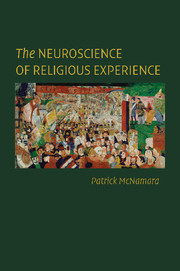Book contents
- Frontmatter
- Contents
- Preface
- Acknowledgments
- 1 God and the Self
- 2 On the Self and the Divided Self
- 3 Mechanisms and Dynamics of Decentering
- 4 Neurology of the Self
- 5 Neurology of Religious Experiences
- 6 Neurochemistry of Religiosity
- 7 Self-Transformation as a Key Function of Performance of Religious Practices
- 8 Self-Transformation through Spirit Possession
- 9 God Concepts
- 10 Religious Language
- 11 Ritual
- 12 Life-Span Development of Religiosity and the Self
- 13 The Evolution of Self and Religion
- References
- Index
13 - The Evolution of Self and Religion
Published online by Cambridge University Press: 30 October 2009
- Frontmatter
- Contents
- Preface
- Acknowledgments
- 1 God and the Self
- 2 On the Self and the Divided Self
- 3 Mechanisms and Dynamics of Decentering
- 4 Neurology of the Self
- 5 Neurology of Religious Experiences
- 6 Neurochemistry of Religiosity
- 7 Self-Transformation as a Key Function of Performance of Religious Practices
- 8 Self-Transformation through Spirit Possession
- 9 God Concepts
- 10 Religious Language
- 11 Ritual
- 12 Life-Span Development of Religiosity and the Self
- 13 The Evolution of Self and Religion
- References
- Index
Summary
Every man who has reached even his intellectual teens begins to suspect that life is no farce; that it is not genteel comedy even; that it flowers and fructifies on the contrary out of the profoundest tragic depths of the essential dearth in which its subject's roots are plunged. The natural inheritance of anyone who is capable of spiritual life is an unsubdued forest where the wolf howls and the obscene bird of night chatters.
– Henry James, Sr., 1866, p. 75Introduction
I have presented evidence in this book that amygdalar, prefrontal, and anterior temporal networks, particularly on the right side, mediate religious experience and core aspects of the sense of Self. The anatomical overlap between religion and Self could be merely fortuitous or it could be functional. I have argued that religion, among many other things, functions, in fact, to construct an executive Self – an autonomous, self-regulating, mature individual. Among its myriad functions, religion can be considered a biocultural system that facilitates maturation of autonomous individual, each of whom is capable of experiencing a unified sense of Self. To that extent, then, religion is an engine that enhances consciousness and self-consciousness in particular.
- Type
- Chapter
- Information
- The Neuroscience of Religious Experience , pp. 246 - 258Publisher: Cambridge University PressPrint publication year: 2009



